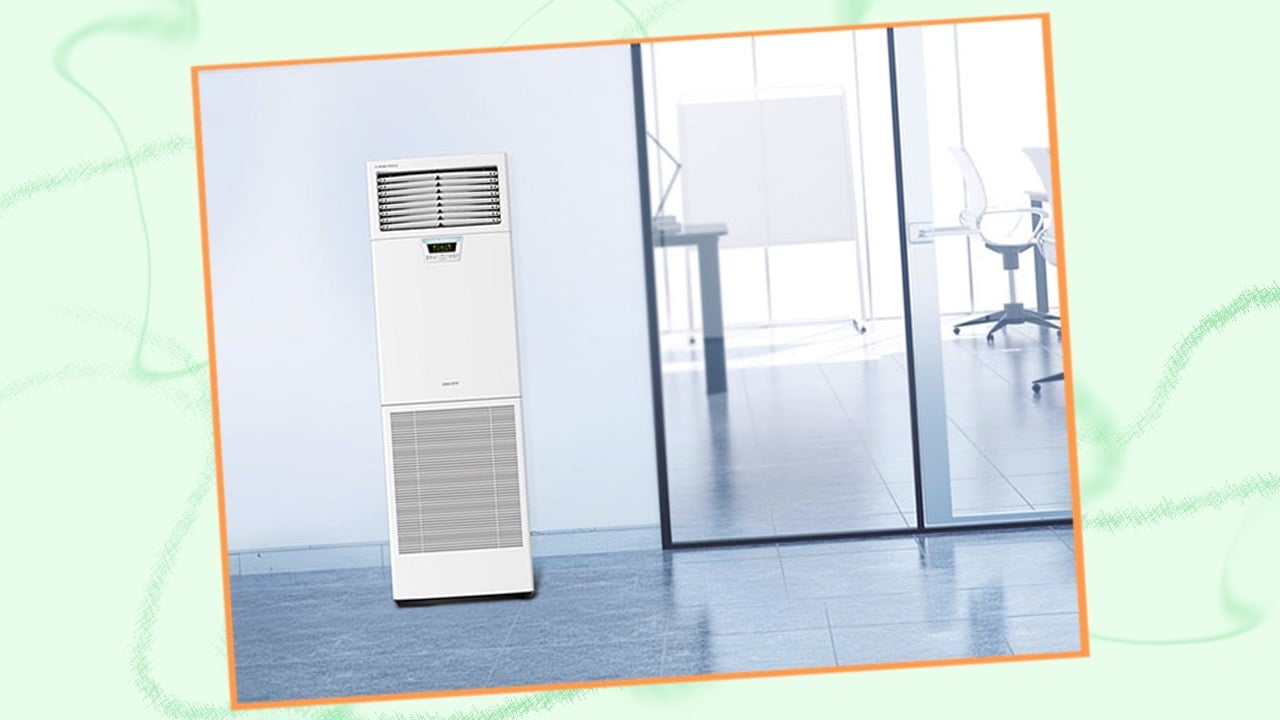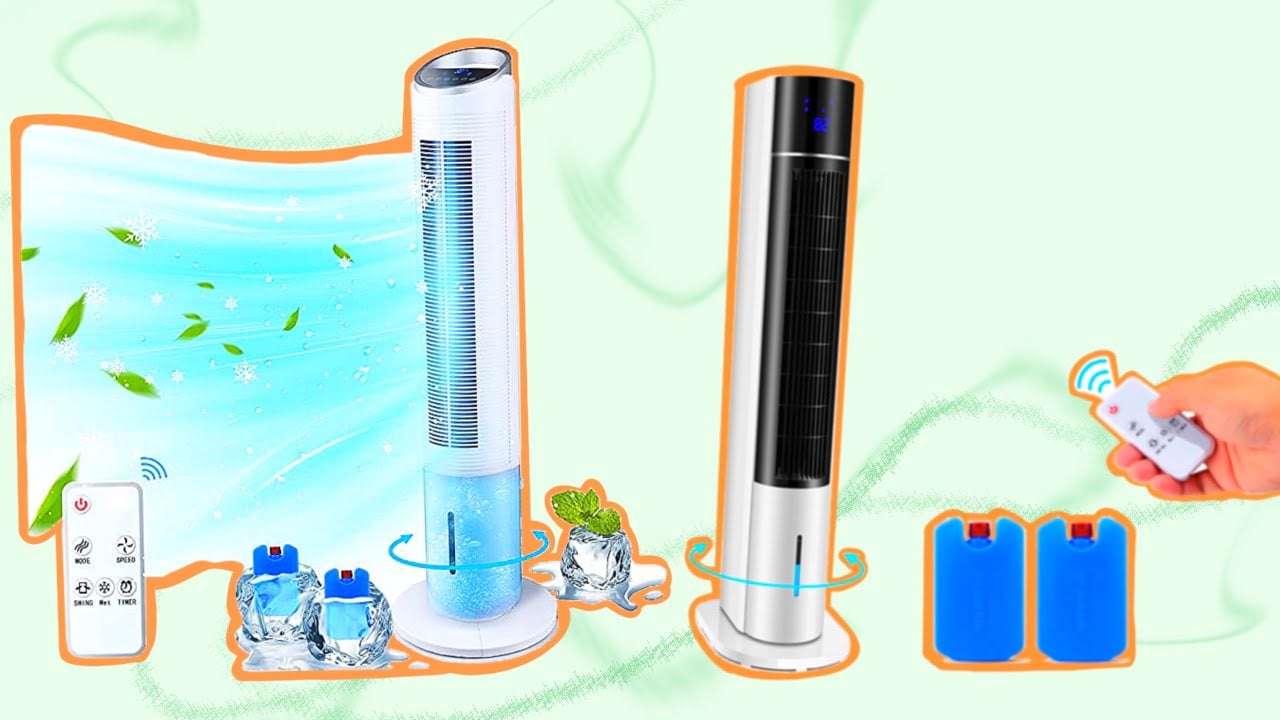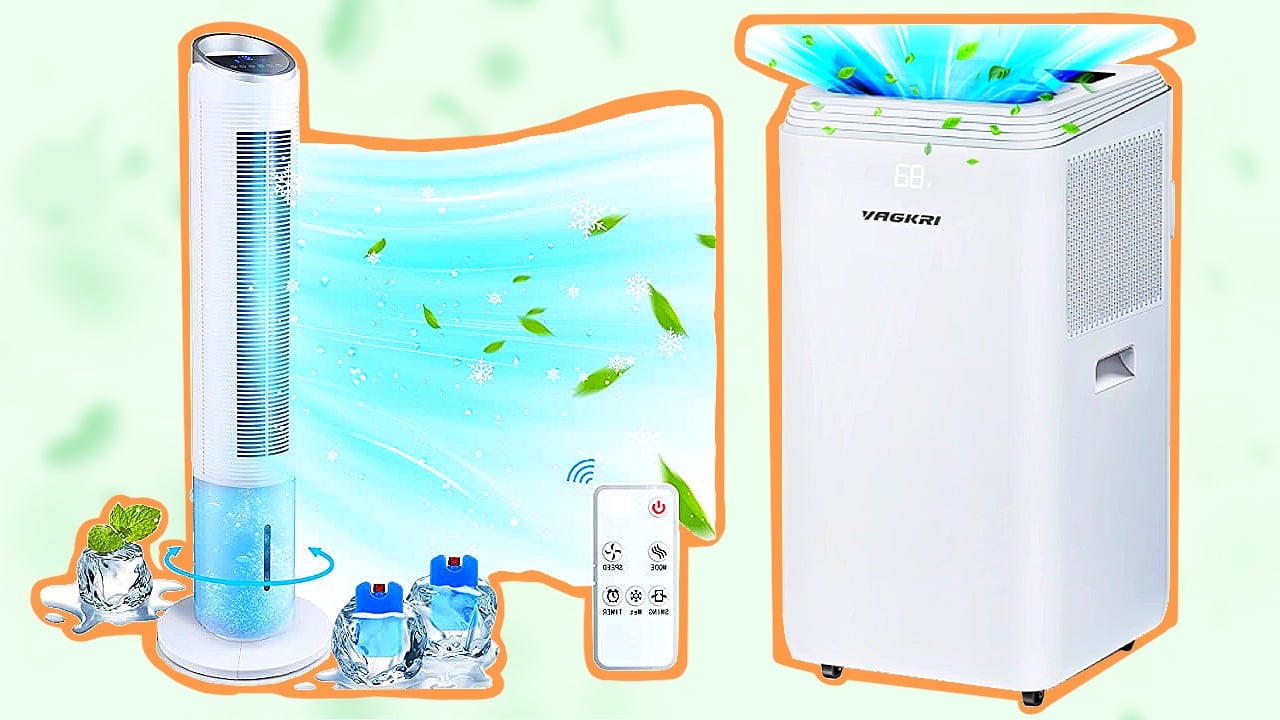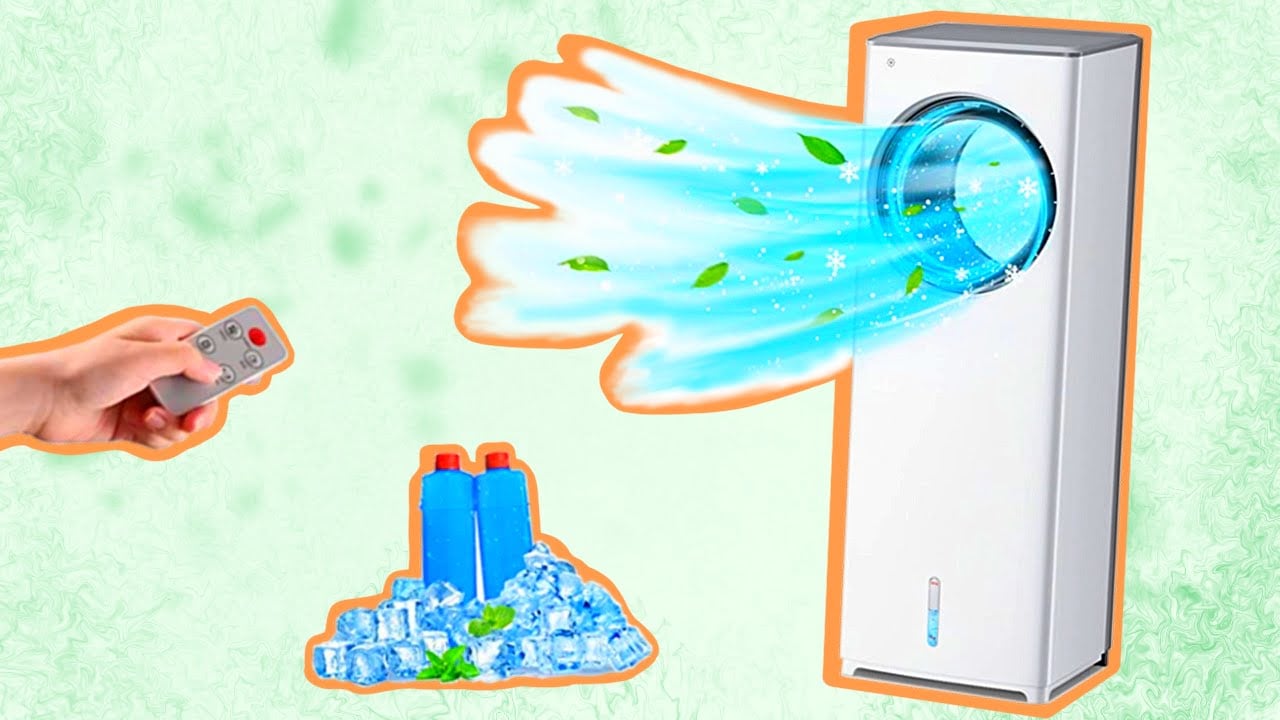Tower air conditioners work by sucking warm air from outside and passing it through condenser coils to cool it before blowing it into the room. Some tower units cool the air by extracting moisture whereas others use water pipes.

The best way to stay cool all summer is to invest in an efficient air conditioner that can cool your home without consuming much energy. Due to their energy efficiency and compact design, tower AC units have been gaining immense traction lately. They are ideal to cool most large spaces, commercial or residential.
However, a common question people have with these units is how they function. So, let's look at how tower air conditioning works.
What Is A Tower AC?

A floor-standing air conditioner, also known as a tower AC, is a dual-hose system that is slightly similar to portable air conditioners. It comprises an indoor and outdoor exhaust hose, where the indoor unit can be placed in any area of the room, whereas the outdoor unit has to be installed outside.
This is because outdoor dual-hose systems will eject hot air, which, if blown inside, can cause overheating within your house. The main advantage of a dual-hose tower AC over a conventional single-hose AC or portable air conditioner is that it takes up significantly less floor space. However, tower air conditioners do not have any wheels attached to them, so moving them around might be cumbersome since they have to be lifted.
How Tower AC Works
The tower air conditioning systems comprise closed loops that are housed within the device, through which the refrigerant is circulated. This refrigerant then absorbs heat when it travels through different components of the AC.
Hot air is released and heat transfer takes place from the evaporator coil when the refrigerant passes through the condenser coil located at the top of the device. A fan performs fresh air intake from the outside environment into the unit and pumps the same over the condenser coils. This manages to cool down both the exterior and the interior of the entire air conditioning unit.
Apart from proper cooling, tower air conditioners make use of powerful filters that ensure the indoor air is free of dust, pollen, mites, and other harmful substances. All in all, a tower air conditioning system is an essential component for keeping the temperature regulated in any environment, be it a home or office space.
How Is A Tower Air Conditioner Different From Window ACs
A traditional air conditioner draws air into your home and cools it down as it passes through several condenser coils. This cooled air is then dispersed back into the room as indoor air.
On the other hand, a cooling tower work differently. Unlike other air conditioners where the condenser coils are housed within the system, the tower air conditioning unit has its coils located on top of the central unit. This forms something similar to a miniature tower.
To cool the area effectively, the tower comprises a cold refrigerant that lies open to the outside atmosphere. When warm air passes through the condenser coils at the top of the cooling tower ac, it turns cold and cool air is blown into your room.
The indoor temperature can also be controlled using the climate control system. So, if you are on the lookout for a unit that cools your home efficiently, a tower air conditioner is the way to go.
Are Tower ACs Better Than Traditional ACs?
Some homeowners tend to opt for a cooling tower air conditioner over traditional air conditioners because they are much more efficient, easy to use, and a lot quieter. Though these factors are valid to some extent, there are other points you'd want to consider when using a new tower air conditioning unit.
Some people believe that a conventional air conditioner offers consistent temperature control throughout the day, and tower units may not be able to do the same. However, tower units maintain air consistency, even during unpredictable weather conditions or prolonged periods of use making it as functional as standard or portable air conditioners.
It is critical to plan how rooms with minimal ventilation and limited sunlight can be cooled before you install a tower AC. The choice between traditional ACs, portable air conditioners, and tower air conditioners is entirely subjective and depends on your preference.
If you require more efficiency in terms of the cooling process, tower ACs might be the better option. Furthermore, tower air conditioners are ideal to have a regulated, pleasant temperature within the room air.
Who Can Use Tower Air Conditioners?
There are several air conditioning units available, and they all come with their respective pros and cons. For instance, a portable air conditioner can be moved around easily, but it may not be as efficient or powerful as a tower AC.
Tower Air conditioners are designed for larger areas and are often used by businesses that need a more extensive range, such as warehouses, commercial facilities, or factories.
Unlike portable air conditioning units, these cooling units can effortlessly cool even larger spaces since they are incredibly high-powered yet energy-efficient. This ensures that all the inhabitants of the space, in both commercial and residential settings, stay comfortable and happy.
So, to answer the question, tower ACs are ideal for people who own large or medium-sized rooms and need consistent cooling throughout.
Power Consumption Of A Tower AC
Tower air conditioners are powerful, energy-efficient units that are a popular choice for keeping homes and other commercial places cool. These air conditioner units are widely known for their sizable circulatory fan blades that enable them to absorb a higher volume of air and push it out rapidly throughout the room air. Not only does this cool air extremely quickly, but it also helps limit the total amount of power consumed by the AC unit.
The design of tower air conditioners makes them much more efficient than split air conditioners or portable air conditioners. This also enables them to function without lowering the overall cooling capacity or compromising on efficiency and performance. Due to this factor, tower ACs are a popular choice among most people to keep their room cool throughout the summer without paying high energy bills.

Things To Consider Before Using A Tower AC
There are several things one should take into consideration before installing a new tower AC, and I have listed the important points below.
1. The Cooling Capacity
The first and foremost thing you have to consider is the cooling tower air conditioners deliver. Along with that, you must determine the overall size of the room in which you plan on installing the new device.
Unlike a portable air conditioner, tower units are usually meant for larger rooms with wide spaces. So, if you have a large living room or commercial space, this option is ideal for you.
2. Power Consumption
Higher energy efficiency in air conditioners will prove to be helpful, especially on those extra hot days when you run the device for long stretches. Since an AC unit can take up a lot of power and add to the overall cost of your energy bill, an energy-efficient cooling option is needed.
Tower ACs are designed to use as little power as possible, so you won't have to worry about unnecessary expenses or power usage.
3. Air Filter And Dehumidifier
With the increase in the number of commercial and personal vehicles on the roads, pollution is increasing at an alarming rate. Additionally, room air can contain several substances like dust and other impurities.
To avoid this, investing in an AC unit with an inbuilt air purifier can help. It will filter the air in your home and purify the air, thus allowing you to breathe clean and fresh air. These filters, apart from creating fresh air, can also be detached and washed for better functioning.
Furthermore, a dehumidifier within the AC unit can help reduce the amount of humidity present in the air. This way, the temperature within your house will stay regulated at all times.
4. All Weather Options
A tower air conditioner is not just a cooling system. It has heating, ventilation, and air conditioning capabilities that can keep you comfortable throughout the seasons. For people with budget constraints, a tower air conditioner can be a cost-effective option, especially in the long run.
5. Cost Of The Device
Since a tower air conditioner can be pretty expensive, looking through all the options available is necessary. Make sure you browse all brands and models, comparing them to find the best fit for your home.
Some branded tower ACs may be cheaper than the rest while offering the same features and functionality. Based on your needs and long-term requirements, you can set a budget accordingly.
Tip
When using a new tower AC, ensure that it has some additional features. These can include accessories like remote control or inbuilt features such as auto mode, air purifier, antibacterial filter, fan mode, self-diagnose mode, auto start, etc. This will improve the overall experience of using a tower air conditioner.
7. Warranty Period
When I use pricy gadgets, I tend to be highly cautious about the warranty period of the same. Similarly, it is necessary that you look at the warranty of the new air conditioner. Aside from the unit as a whole, look at the warranty options for the compressor of your AC unit.
This way, if you encounter any problems with your device, you can always claim a warranty and get it fixed. The last thing anybody would want is to spend a good amount of money on a product and spend even more on its repairs.
You can also take customer service into consideration when installing a new product, such as options for home delivery.
Pros And Cons Of Tower ACs
Pros:
1. Cooling
Tower air conditioners are great in terms of energy-efficient cooling. Generally, standard and portable air conditioners can result in a pricey power bill, which is why options such as this with minimal power usage can be useful. The limited power consumption does not necessarily equate to insufficient cooling. In fact, tower ACs have impressive cooling capabilities and can effortlessly lower the temperature in a large space in no time.
2. Easy Installation And Affordable
Unlike other traditional systems, tower air conditioners do not require further installation, and you can simply unbox them to begin using the AC. These air conditioners are also much cheaper than conventional AC units and are a cost-effective way to keep your home cool, even in harsh summer conditions.
Cons:
1. Unsuitable For Small Rooms
As impressive as they are, tower ACs come with their fair share of disadvantages. The major one is the inability to be used in smaller rooms, as tower ACs are designed to cool down larger areas, be it a home or a commercial space. When used in a smaller area, it can be overpowering and unnecessary.
2. Bulky And Oversized
Additionally, though these devices are known for their efficiency, they are quite bulky and oversized. Agreed, you can move it around without any problems, but the weight of the device can make this more challenging than it should be.
3. Lack Of Portability
Portable room air conditioners can be quite helpful if you're always on the move. However, it is not necessary that all tower units can be moved around like a portable AC unit. Some portable air conditioning units can be pretty lightweight that makes moving them around comparatively easier. If portability is a factor for you, refrain from opting for a heavier tower air conditioner or and go for portable room air conditioners instead.
Tower air conditioners have a higher capacity compared to other ACs and are also portable. Moreover, they are considered by many as the best electronic units for climatic control. Instead of a central cooling system, you can use a tower AC because such units deliver better cooling in large spaces. he top benefits of a tower AC includes – The top 5 tower AC brands are – You know that hot air rises to the top while cold air sinks to the bottom. That’s why, it would be best to install a tower AC at least 2 metres from the ground and high on the wall, so that cold air circulates around the room well. Tower ACs have a cooling tower, responsible for creating a stream of cold water as it passes through the heat exchanger. This helps cool the hot condenser coils, while the tower uses a stream of water to blow cool air because the water stream evaporates and lowers the temperature of the air. You have to keep filling the tower AC with water to make up for water lost due to evaporation. Moreover, relative humidity and barometric pressure determines how much cooling a tower AC can deliver.Tower AC Related FAQs

Final Words
After a long summer day, the last thing you would want is to come back to humid air and an uncomfortable environment in your home. If you've been pushing aside investing in an AC system all this while, tower air conditioners might be worth looking into.
Not only are they affordable when compared to a traditional or portable air conditioners, but they also consume much less power. With a lower power bill, along with a cool and comfortable home, what more could you ask for?
Read my guide to clear all your doubts and I hope you have a cool summer!
